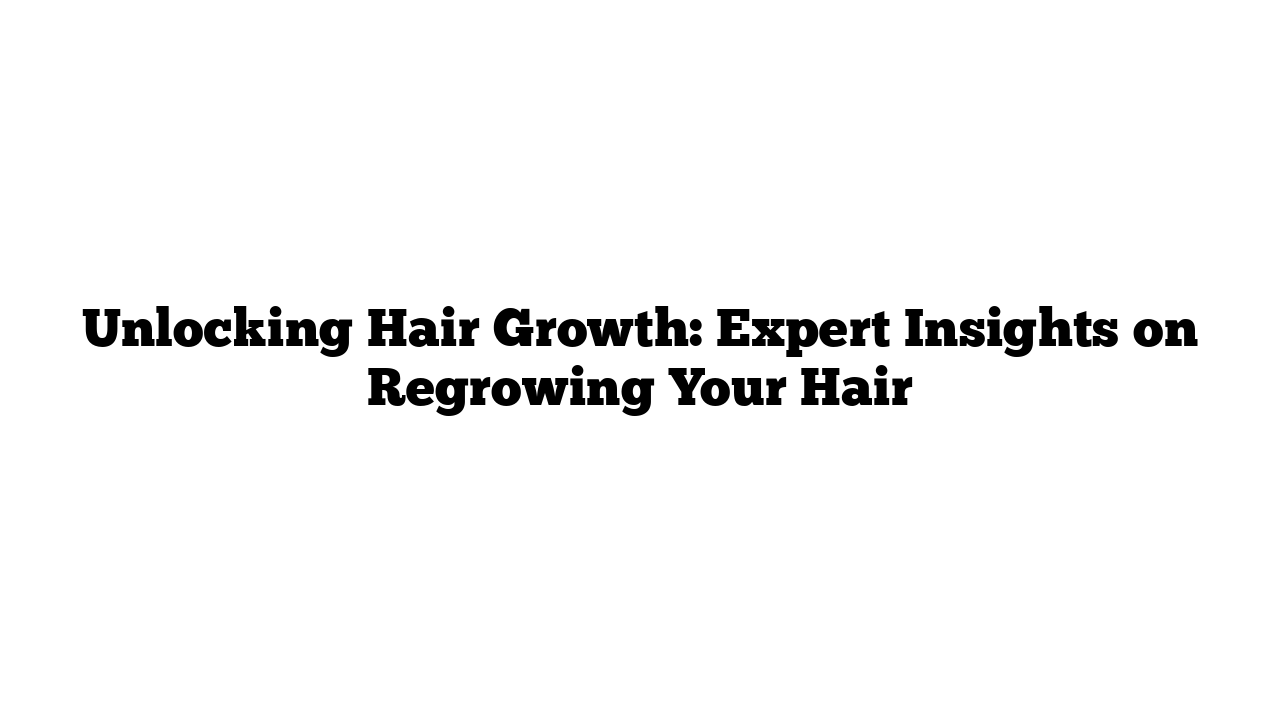Are you struggling with hair loss or thinning hair? You’re not alone! Many people face similar challenges. In this article, we’ll explore effective strategies to regrow your hair. Whether you have alopecia or just want to boost your hair’s volume, this guide will provide you with vital information to help you on your journey.
Understanding Alopecia and Hair Loss
Alopecia simply means hair loss. It doesn’t specify the cause, but various factors can lead to thinning or loss of hair.
Many people seek a “magic pill” for hair regrowth, and while there are options available, it’s essential to understand the underlying causes first.
Effective Medications for Hair Regrowth
Two well-known medications for hair loss are finasteride and minoxidil.
- Finasteride: This medication helps reduce the progressive loss of hair by blocking certain hormones.
- Minoxidil: This topical solution increases the overall fullness of your hair.
Both treatments have shown significant results for many individuals.
The Role of Lysine in Hair Growth
Lysine is an amino acid that can significantly impact hair health. It helps strengthen hair and improve elasticity. Here’s how you can ensure you’re getting enough lysine:
- Sources of Lysine:
- Red meat
- Eggs
- Fish
Plant proteins are generally poor sources of lysine, so incorporating these foods into your diet can help strengthen your hair.
Why Iron Matters
Iron plays a crucial role in hair health. It helps nourish hair follicles, and low levels of iron can lead to hair loss.
While many people’s iron levels are normal, it’s essential to consider getting your levels checked if you’re experiencing hair loss. Red meat and organ meats are excellent sources of iron.
Stress and Hair Loss
Stress can have a profound effect on hair health. When you’re stressed, your body produces more cortisol, which can lead to hair loss.
If you’re facing high-stress levels, consider methods to reduce stress, such as:
- Exercise: Physical activity can help lower cortisol levels.
- Mindfulness: Practices like meditation can alleviate stress.
The Connection Between Gut Health and Hair Growth
Did you know your gut health can impact your hair? Your gut is home to friendly bacteria that aid in the absorption of nutrients.
If you have gut inflammation or malabsorption, you might not be getting the essential amino acids and minerals needed for healthy hair. A diet rich in probiotics can help restore gut health.
Read: Effective Scalp Massages for Faster Hair Growth in 2024!
Understanding DHT and Hair Loss
Dihydrotestosterone (DHT) is a hormone that can cause hair follicle miniaturization, leading to hair loss.
To combat this, consider natural DHT blockers such as:
- Zinc: Found in red meat, zinc helps inhibit DHT and is vital for hair regrowth.
- Saw Palmetto and Pumpkin Seed Oil: Both are known natural DHT inhibitors.
These options can be useful adjuncts to medications like finasteride.
Final Thoughts on Hair Regrowth
Regrowing hair is a journey that requires patience and a multifaceted approach. By understanding the causes of hair loss and incorporating dietary and lifestyle changes, you can enhance your hair growth potential.
As always, consult a healthcare professional for personalized advice and treatment options.
For more detailed articles and expert tips, visit the medicaltimes.io website.
References
- American Academy of Dermatology on Hair Loss
- National Institutes of Health on Iron Deficiency
- WebMD on Stress and Hair Loss
Feel free to reach out with any questions or share your experiences in the comments below!
